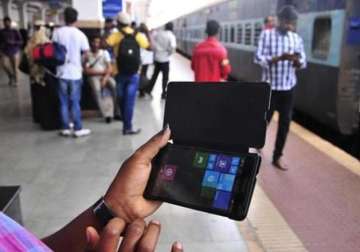Digital India: Railway broadband to touch half million homes within 2 years
Kolkata: Carving a niche for itself in the Connected India-2020 project, Railtel Corporation's broadband will reach 500,000 households through its Railwire network providing a host of services at the block level in the next two

Kolkata: Carving a niche for itself in the Connected India-2020 project, Railtel Corporation's broadband will reach 500,000 households through its Railwire network providing a host of services at the block level in the next two years, a top railway official has said.
The Broadband Highway will involve a three-layer network - state capitals to district headquarters, district to sub-divisional and then to gram panchayats which will be joined to the National Optic Fibre Network (NOFN), Pradeep Kumar, executive director (East) of Railtel Corporation of India, told a Global Communication Conclave here.
The Conclave, 10th in a series organised by the Public Relations Council of India (PRCI), conducted a knowledge forum with the theme 'Digital Now- What Next'.
Pradeep Kumar said Railwire network architecture provides the answer for 'What Next' as it will empower the people at village level with knowledge, skill development and core competencies. "This will lead to good governance and transparent, corruption-free governments."
Railtel's pan-India optic fibre network covers 4,400-plus railway stations across 44,300 km.
Railwire has also begun to tap the local cable operators focussing on pure-play broadband and VPN services, content and application-driven network. "Our aim is to become a hub of local information and tool for rendering communication, infotainment, education, health and community services to the masses," Pradeep Kumar said.
In Eastern India alone, Railtel seeks to cover 36,000 gram panchayats and the broadband services include emails, online newspapers, online passport application, tele-medicine, examination results and net surfing for students with a minimum 2Mbps speed.
The company's pilot projects at Panisagar and Girania in Tripura have aroused a lot of interest and enthusiasm, Pradeep Kumar said.
For the Railways itself, Railtel provides mission-critical services such as computerised passenger reservation and ticketing system.
West Bengal Women's Welfare and Child Development Minister Sashi Panja, who inaugurated the two-day conclave, focussed on communicators' role in ensuring the safety of women and children. In this context, she appreciated PRCI for setting up an internal compliance cell as the Sexual Harassment of Women at Workplace (Prevention, Prohibition and Redressal) Act makes it mandatory for all organisations to have such cells.
Explaining the significance of the conclave theme, PRCI national president and veteran media professional B.N. Kumar said it was important for communication professionals to keep themselves updated with the latest technology trends to be able to meet ever-increasing challenges.
PRCI also focuses on skill development for communication professionals by expanding its operations and network not only across India but globally as well, he said.
PRCI chairman emeritus and chief mentor M.B. Jayaram said it was high time that the PR professionals thought big, embraced emerging challenges and converted them into opportunities and moved towards a digital-first approach. The organization will soon initiate collaborative programmes with various business and technology forums to help the professionals upgrade their skills.
PRCI, on the occasion, felicitated national achievers from among communication professionals with its coveted Chanakya awards, inducted senior practitioners into PR Hall of fame and presented a host of collateral awards at the conclave.
Ujjivan Financial Services won the Corporate Citizen award, while Apollo Gleneagles Hospitals was given the innovative leadership award. Dainik Bhaskar Bhopal was given the excellence in social leadership award while Businessworld fortnightly was adjudged the Magazine of the Year.